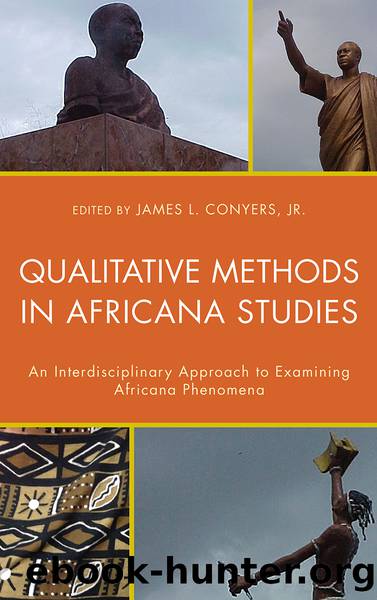Qualitative Methods in Africana Studies by Conyers James L. Jr.;

Author:Conyers, James L., Jr.;
Language: eng
Format: epub
ISBN: 9780761867531
Publisher: University Press of America, Incorporated
Section V
Afrocentric Perspectives and Research Methods
Chapter 14
The African-Centered Worldview toward a Paradigm for Social Work
MEKADA J. GRAHAM
Social work interventions with black families and children have been the source of controversy, conflict, and disquiet for many decades. Research evidence continues to indicate that Black communities are over-represented in those services that involve social control functions such as the juvenile justice system in its dealings with young Black people, compulsory admissions to psychiatric units, and child protection. Black families are underrepresented in receiving preventative and supportive aspects of service delivery (Barn, 1993; Clarke et al., 1993; Roys, 1993; Lambert and Rowe, 1982; Skellington and Morris, 1992). Black communities and Black professionals in the field continue to voice their general dissatisfaction with social work interventions and with the disabling effects of the social work process (Harris, 1991).
The Association of Black Social Workers and Allied Professions (ABSWAP) provided compelling evidence to the House of Commons Social Services Committee in 1983 highlighting the plight of Black children in the care system and was active in identifying the need for a legislative framework that addresses race, culture, and language in the provision and delivery of services (ABSWAP, 1983). Despite the introduction of the 1989 Children Act, and in particular Section 22(5)(c), which clearly requires local authorities to give due consideration to âthe childâs religious persuasion, racial origin and cultural and linguistic backgroundâ in the provision of services and service delivery, Black children of all ages and both sexes continue to be overrepresented in the public care system (Barn et al., 1997; Lambert and Rowe, 1982; Rowe et al.). Research evidence suggests that the lack of appropriate preventative support services and a lack of understanding of the cultural orientation of Black families often result in social work operating against the interests of Black children (MacDonald, 1992;Barn, 1993).
Institutional racism has been identified as one of the key factors in the continued oppression of Black families within society, its effects compounded by âthe systemâ of social welfare (Mercer, 1984). Dominelli (1988) and Ahmad (1990) have provided a well-documented exposition of racism in social work and of the continuing need to construct antiracist strategies that are incorporated into social work practice rather than merely offering an understanding of the nuances of racism in wider society. The main thesis of this article examines the ethnocentric nature of social work designs that purport to address the physical, intellectual, psychological, emotional, spiritual, and social needs of Black people. It is argued, moreover, that the theoretical foundations of established social work practice models do not reflect the diversity of worldviews and cultural values found in Britain today. My concern in this article centers on the core principles of social workâsocial justice, equality and self-determinationâessential ingredients of all social work interventions, yet values which, it is argued, cannot be actualized when the social work knowledge base is dominated by a Eurocentric worldview.
The African-centered worldview challenges social work to expand its philosophical and intellectual base to embrace humanity; to release the domination of the Eurocentric worldview
Download
This site does not store any files on its server. We only index and link to content provided by other sites. Please contact the content providers to delete copyright contents if any and email us, we'll remove relevant links or contents immediately.
american english file 1 student book 3rd edition by Unknown(618)
Phoenicians among Others: Why Migrants Mattered in the Ancient Mediterranean by Denise Demetriou(613)
Verus Israel: Study of the Relations Between Christians and Jews in the Roman Empire, AD 135-425 by Marcel Simon(596)
Basic japanese A grammar and workbook by Unknown(586)
Caesar Rules: The Emperor in the Changing Roman World (c. 50 BC â AD 565) by Olivier Hekster(583)
Europe, Strategy and Armed Forces by Sven Biscop Jo Coelmont(525)
Give Me Liberty, Seventh Edition by Foner Eric & DuVal Kathleen & McGirr Lisa(502)
Banned in the U.S.A. : A Reference Guide to Book Censorship in Schools and Public Libraries by Herbert N. Foerstel(492)
The Roman World 44 BC-AD 180 by Martin Goodman(480)
Reading Colonial Japan by Mason Michele;Lee Helen;(472)
DS001-THE MAN OF BRONZE by J.R.A(471)
Introducing Christian Ethics by Samuel Wells and Ben Quash with Rebekah Eklund(470)
Imperial Rome AD 193 - 284 by Ando Clifford(459)
The Dangerous Life and Ideas of Diogenes the Cynic by Jean-Manuel Roubineau(459)
The Oxford History of World War II by Richard Overy(456)
Catiline by Henrik Ibsen--Delphi Classics (Illustrated) by Henrik Ibsen(448)
Language Hacking Mandarin by Benny Lewis & Dr. Licheng Gu(416)
Literary Mathematics by Michael Gavin;(411)
Brand by Henrik Ibsen--Delphi Classics (Illustrated) by Henrik Ibsen(406)
